

Integrated curriculum and financial planning (ICFP) Overview Integrated curriculum and financial planning (ICFP) is a management process that helps schools plan the best curriculum for their pupils with the funding they have available.
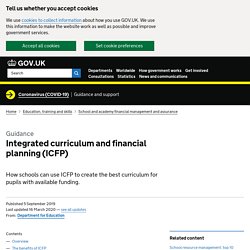
It can be used at any phase or type of school. ICFP involves measuring your current curriculum, staffing structure and finances, and using the data to create a 3 to 5 year plan. ICFP is not new The idea of linking curriculum and financial planning is not new. The benefits of ICFP. How curriculum planning can achieve greater financial efficiency. Module 4: Strategic financial planning. Achievement for All. Achievement for All is a whole-school improvement programme that aims to improve the academic and social outcomes of primary school pupils.
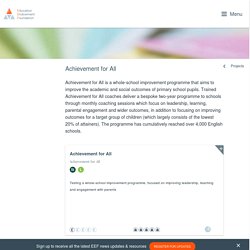
Trained Achievement for All coaches deliver a bespoke two-year programme to schools through monthly coaching sessions which focus on leadership, learning, parental engagement and wider outcomes, in addition to focusing on improving outcomes for a target group of children (which largely consists of the lowest 20% of attainers). The programme has cumulatively reached over 4,000 English schools. Testing a whole-school improvement programme, focused on improving leadership, teaching and engagement with parents addclose Independent Evaluator University of Manchester Themes St Staff deployment & development.
Ofsted school funding study: 10 things we learned. Ofsted has finally published its long-awaited research into the impact of funding pressures on schools.

The study was not supposed to be released until a few weeks’ time. But the watchdog accidentally published a blog by chief inspector Amanda Spielman about it earlier this week, leading to widespread media coverage and criticism of her comments about financial management. For the research, Ofsted surveyed 201 headteachers, conducted 18 telephone interviews with leaders, held focus groups and made research visits to 16 schools. Here are the 10 most interesting findings from the report. 1. While Ofsted welcomed the government’s commitment to increase the school budget by £7.1 billion by 2022-23, the watchdog warned that “even if this meets schools’ immediate needs, shortfalls in local authority funding will continue to affect them”. 2.
Pupil Premium Guidance. Integrated curriculum and financial planning (ICFP) Good estate management for schools - Guidance. This much I know about the challenges for early career headteachers: understa... I have been a teacher for 31 years, a head teacher for 16 years and, at the age of 55, this much I know about the challenges for early career headteachers: understanding the finances.

I am in my seventeenth year as a state school secondary head teacher. Recently I was interviewed by an organisation exploring the biggest challenges for early career head teachers. I began the interview with the knotty question, “What do you mean by head teacher?” We settled on the traditional definition of the head teacher who runs the school with a significant level of autonomy, both challenged and supported by a traditional governing body in a critical friend role. I identified eight major challenges for early career head teachers: In this current series of short blog posts, I am addressing each of these challenges and providing some tips which might help early career head teachers to overcome them. Understanding the finances. How to write a business case. A business case is the most important document you will ever need to write for a project.

It explains why your organisation will invest time and resources into a project. Without a rock-solid business case your project is unlikely to get a return on investment. This article explains how to write one, includes some examples and includes a free business case template for you to download. After reading this article, why not check out our business case writing course? Introduction. Academies Financial Handbook: changes from September 2019. Key Changes to the Academies Financial Handbook (AFH) 2019. Academies Financial Handbook - Guidance. Academies Financial Handbook - Guidance. DfE launches good estate management guidance for schools. School Estate Management Plan - West Lothian Council.
The impact of the Prevent duty on schools: A review of the evidence - Jerome - 2019 - British Educational Research Journal. The UK has emerged as an influential global player in developing policy to counter violent extremism, and therefore it is important to consider the emerging evidence about the impact of this policy in education.
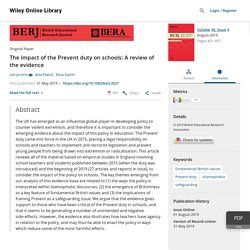
The Prevent duty came into force in the UK in 2015, placing a legal responsibility on schools and teachers to implement anti‐terrorist legislation and prevent young people from being drawn into extremism or radicalisation. This article reviews all of the material based on empirical studies in England involving school teachers and students published between 2015 (when the duty was introduced) and the beginning of 2019 (27 articles and reports in total), to consider the impact of the policy on schools. What are my school's responsibilities under the Prevent duty? - Educate Against Hate.
If you are a head teacher, it’s your responsibility to put in place robust procedures to protect your students from radicalisation and extremism.

As a school leader, you are also responsible for the review and evaluation of these procedures, and making sure they are effective. These procedures may be set out in existing safeguarding policies; you do not necessarily need to have distinct policies on implementing the Prevent duty. Every school is different and a ‘one size fits all’ approach to dealing with the threat of extremism won’t work. However, you must make sure that you have considered what is appropriate in your school based on your risk assessment and taking into account the circumstances of your school and its local community. There are no mandatory reporting requirements under the duty. Prevent duty guidance. Court of Appeal judgment The Court of Appeal ruled on 8 March 2019 that one paragraph contained within the Prevent duty guidance for higher education institutions in England and Wales (paragraph 11) was unlawful.
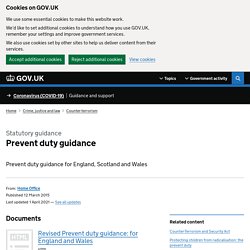
The same, or a very similar, paragraph is also contained in the Prevent duty guidance for further education institutions in England and Wales (paragraph 8), the Prevent duty guidance for higher education institutions in Scotland (paragraph 11), and the Prevent duty guidance for further education institutions in Scotland (paragraph 8). This judgment only affects that one paragraph in each of those documents and the rest of those documents, and the other Prevent duty guidance documents, should continue to be read as before. Protecting children from radicalisation: the prevent duty. Maintaining the school estate. Skip to main content Home / Features / Maintaining the school estate.

Strategic estate management - Good estate management for schools - Guidance. An asset management plan is a short to medium-term plan.
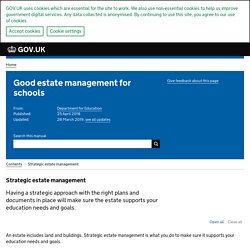
It should detail and prioritise what actions you need to take to fulfil the estate strategy. It will provide the foundation for all estate related activities by: Risk Registers & Guidance : Academic and Corporate Governance. Risk is the effect of uncertainty on the institution's ability to meet its objectives. Risk registers are tools that aim to help managers evaluate and monitor risks in order to inform decision-making.
Risk registers are useful for providing oversight of key risks, and an awareness of the risk environment can help to meet strategic objectives effectively. A blank risk register template is available for Schools/Directorates to use in order to complete their own risk registers. A risk register should not be filled out by one individual; key individuals should be involved to ensure that the risk register is a comprehensive tool and that all potential significant risks are included. The Institutional Risk Register may be a useful example in terms of how to fill out a risk register, however, it is worth considering whether the 'impact' scale is accurate in relation to all Schools/Directorates; will your major risks be >5M or would a lower/higher scale be more relevant?
Strategic Risk Register Template for Schools. The Key for School Leaders. Health and safety in schools - RoSPA. In an article in The Sunday Telegraph Amanda Spielman, the chief inspector of Ofsted, said that schools should stop “wrapping their children in cotton wool”, because overzealous health and safety policies are denying them the chance to develop “resilience and grit”. We couldn’t agree more. RoSPA’s mantra is “teaching safely, teaching safety”. Primary Schools Guidelines - Health and Safety Authority. Sensible health and safety management in schools. Skip to content This website uses non-intrusive cookies to improve your user experience.
You can visit our cookie privacy page for more information. Health and Safety Executive Health and Safety Executive Beta This is a new way of showing guidance - your feedback will help us improve it. Is this page useful? Yes No. Health and safety: responsibilities and duties for schools. 1. Responsibilities Pupils should be safe in school and when undertaking out of school activities.
The risk management to keep them safe should be proportionate to the nature of the activities. Safeguarding Training and Consultancy. Keeping children safe in education (KCSIE) 2019. At 12:30am, Wednesday June 26th, the government published a draft update to Keeping children safe in education. This comes just one year after the 2018 update so there are not a large number of changes, but as there are references to specific safeguarding issues such as upskirting and serious violence, knowledge of these key issues will be vital.
Keeping Children Safe in Education (KCSIE): summary. Keeping children safe in education. CASPAR briefing. Keeping children safe in education.